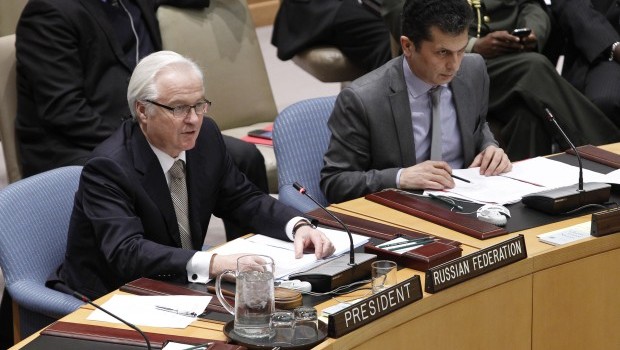
Vitaly Churkin (L), President of the Security Council for March, chairs the Security Council meeting on the situation concerning the Democratic Republic of the Congo (DRC) in New York, March 28, 2013 (UN Photo/JC McIlwaine)
The 15-member Security Council unanimously adopted a resolution establishing the so-called intervention brigade—the first time the United Nations has created such a unit within a traditional peacekeeping force—as part of the existing 20,000-strong U.N. force in Congo, the UN Stabilization Mission in the Democratic Republic of Congo, known as MONUSCO.
It says MONUSCO will “carry out targeted offensive operations through the Intervention Brigade … either unilaterally or jointly with the (Congo army), in a robust highly mobile and versatile manner . . . to prevent expansion of all armed groups, neutralize these groups, and to disarm them.”
The resolution also states that the intervention brigade will be made up of three infantry battalions, one artillery and one special force and reconnaissance company headquartered in Goma under the direct command of the MONUSCO force commander.
Diplomats say South Africa, Tanzania and Malawi are the most likely candidates to supply the troops for the intervention unit. Mozambique had also been tipped to be part of the new unit but it will likely not be part of the new brigade.
Council diplomats say that the African Union has pushing for the establishment of a “peace enforcement” wing of MONUSCO, even though the UN peacekeeping department, a number of council members and human rights groups have expressed concerns about how the force will work in reality.
The resolution also says that a Congolese rapid reaction force should be created with the intention of taking over the work of the intervention brigade once it completes its job.
Until now MONUSCO had a traditional peacekeeping mandate to protect civilians and support operations by the Congolese army in Congo—a country the size of Western Europe.
The resolution makes clear that the intervention brigade will be established “on an exceptional basis, and without creating a precedent or any prejudice to the agreed principles of peacekeeping.”
After the vote, Guatemalan Ambassador Gert Rosenthal voiced concerns to the council about the creation of the intervention brigade, saying it should be entirely separate from MONUSCO.
The United States had also previously raised concerns that there was not a clear enough distinction between the job of the intervention brigade and the existing peacekeepers, council diplomats said.
The United Nations has avoided peace enforcement since its involvement in Somalia in the 1990s. That involvement withered after the 1993 “Black Hawk Down” incident in which militia fighters shot down two US military helicopters over Mogadishu.
Separately, the United Nations has given Congo four more days to begin prosecuting soldiers accused of raping scores of women in an eastern town or it will halt support to two battalions.
The United Nations said 126 women were raped in Minova in November after Congolese troops fled to the town as so-called M23 rebels briefly captured the nearby provincial capital of Goma.
The UN special envoy to Congo, Roger Meece, informed Congolese authorities in a March 25 letter that they had seven days to take action.
“The letter informed the Congolese Government of the termination of all MONUSCO support to the two battalions involved in the Minova rapes, should no appropriate action be taken immediately, within 7 days,” a spokesman for the UN department of peacekeeping said.
The United Nations had previously told Congo that it would end support to two battalions linked to the Minova rapes if it did not try the soldiers involved.
UN spokesman Martin Nesirky said in December that alleged human rights abuses were committed in and around Minova between Nov. 20 and Nov. 30, including the 126 rapes and the killing of two civilians. Nesirky said at the time that two soldiers were charged with rape, while seven more were charged with looting.
Peacekeepers have been stretched thin by the M23 rebellion in the resource-rich east of Congo. That is why the council created the special intervention force, which one senior council diplomat has said will be able to “search and destroy” the M23 rebels and other armed groups in the country.
M23 began taking parts of eastern Congo early last year, accusing the government of failing to honor a 2009 peace deal. That deal ended a previous rebellion and led to the rebels’ integration into the army, but they have since deserted.
M23, which a UN expert panel said last year was backed by Rwanda, has struggled with infighting in recent weeks.
Rwanda, which is on the Security Council until the end of 2014, voted for the creation of the intervention force. Rwandan Ambassador Eugene Richard Gasana told the council Kigali was committed to peace in neighboring Congo.
African leaders signed a UN-mediated accord late last month aimed at ending two decades of conflict in eastern Congo and paving the way for the creation of the intervention force.
